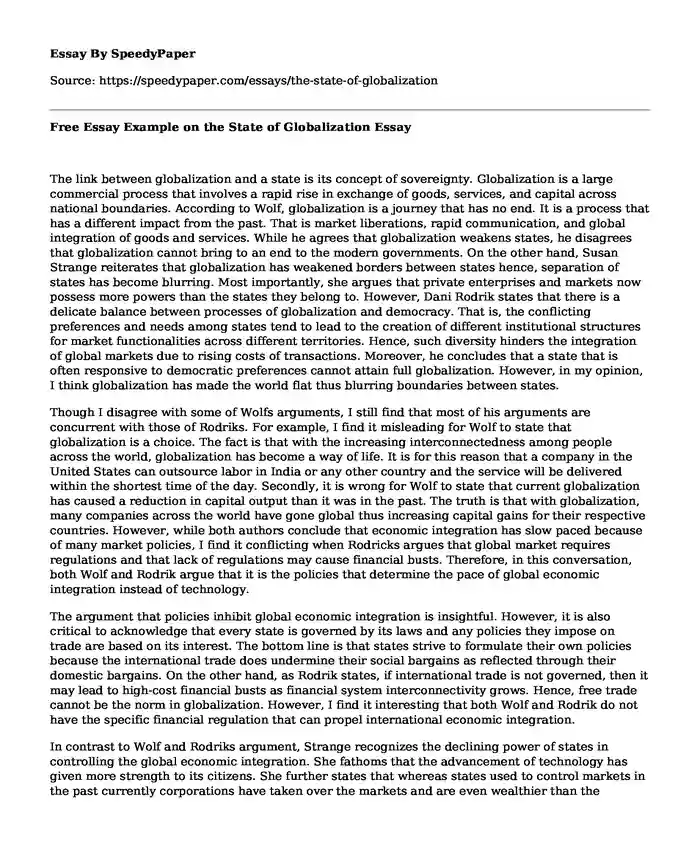
| Type of paper: | Essay |
| Categories: | Globalization Economics |
| Pages: | 3 |
| Wordcount: | 695 words |
The link between globalization and a state is its concept of sovereignty. Globalization is a large commercial process that involves a rapid rise in exchange of goods, services, and capital across national boundaries. According to Wolf, globalization is a journey that has no end. It is a process that has a different impact from the past. That is market liberations, rapid communication, and global integration of goods and services. While he agrees that globalization weakens states, he disagrees that globalization cannot bring to an end to the modern governments. On the other hand, Susan Strange reiterates that globalization has weakened borders between states hence, separation of states has become blurring. Most importantly, she argues that private enterprises and markets now possess more powers than the states they belong to. However, Dani Rodrik states that there is a delicate balance between processes of globalization and democracy. That is, the conflicting preferences and needs among states tend to lead to the creation of different institutional structures for market functionalities across different territories. Hence, such diversity hinders the integration of global markets due to rising costs of transactions. Moreover, he concludes that a state that is often responsive to democratic preferences cannot attain full globalization. However, in my opinion, I think globalization has made the world flat thus blurring boundaries between states.
Though I disagree with some of Wolfs arguments, I still find that most of his arguments are concurrent with those of Rodriks. For example, I find it misleading for Wolf to state that globalization is a choice. The fact is that with the increasing interconnectedness among people across the world, globalization has become a way of life. It is for this reason that a company in the United States can outsource labor in India or any other country and the service will be delivered within the shortest time of the day. Secondly, it is wrong for Wolf to state that current globalization has caused a reduction in capital output than it was in the past. The truth is that with globalization, many companies across the world have gone global thus increasing capital gains for their respective countries. However, while both authors conclude that economic integration has slow paced because of many market policies, I find it conflicting when Rodricks argues that global market requires regulations and that lack of regulations may cause financial busts. Therefore, in this conversation, both Wolf and Rodrik argue that it is the policies that determine the pace of global economic integration instead of technology.
The argument that policies inhibit global economic integration is insightful. However, it is also critical to acknowledge that every state is governed by its laws and any policies they impose on trade are based on its interest. The bottom line is that states strive to formulate their own policies because the international trade does undermine their social bargains as reflected through their domestic bargains. On the other hand, as Rodrik states, if international trade is not governed, then it may lead to high-cost financial busts as financial system interconnectivity grows. Hence, free trade cannot be the norm in globalization. However, I find it interesting that both Wolf and Rodrik do not have the specific financial regulation that can propel international economic integration.
In contrast to Wolf and Rodriks argument, Strange recognizes the declining power of states in controlling the global economic integration. She fathoms that the advancement of technology has given more strength to its citizens. She further states that whereas states used to control markets in the past currently corporations have taken over the markets and are even wealthier than the government. For example, the American companies have an immense impact on the stockholders, citizens and the government.
In conclusion, globalization has weakened states thus blurring boundaries. The advancement of technology has increased interconnectivity across the globe. Therefore, it is wrong for Wolf to assert that globalization is a choice. In addition, globalization has increased trade across the world. Though policies are slowing international economic integration, is also important that international trades are governed. However, despite the regulatory policies in place, states have lost the power of the global markets to their citizens and corporations.
Cite this page
Free Essay Example on the State of Globalization. (2019, Nov 18). Retrieved from https://speedypaper.net/essays/the-state-of-globalization
Request Removal
If you are the original author of this essay and no longer wish to have it published on the SpeedyPaper website, please click below to request its removal:
- Ethanol Fuel Research Essay Sample
- The Renaissance Essay Sample
- Free Essay: Cultural Practice of Self-presentation
- Why We Buy a Product, Marketing Essay in the Example of Oreo
- Movie Review Essay Sample: The Apology (2016) Critical Analysis
- Essay Example on New Zealand's Nuclear-Free Stance Affects Its Security Status
- Paper Example. North Korea Political Economics
Popular categories




